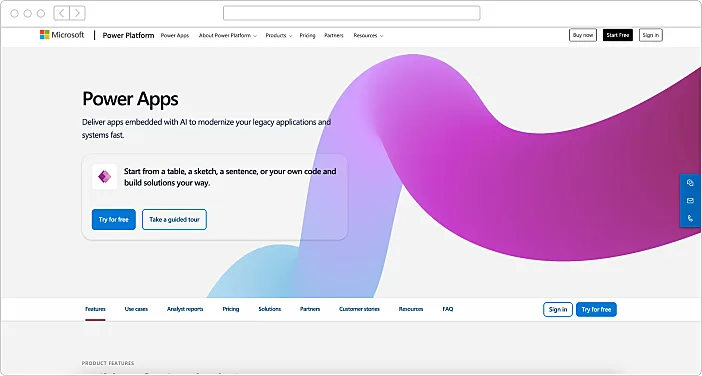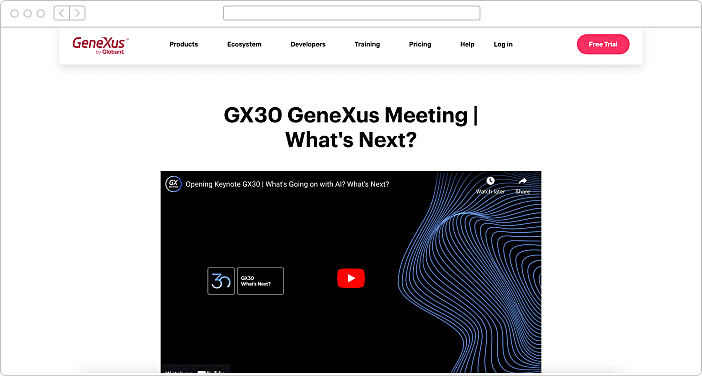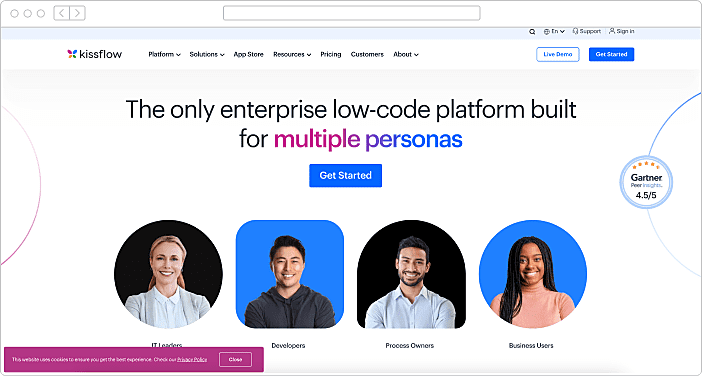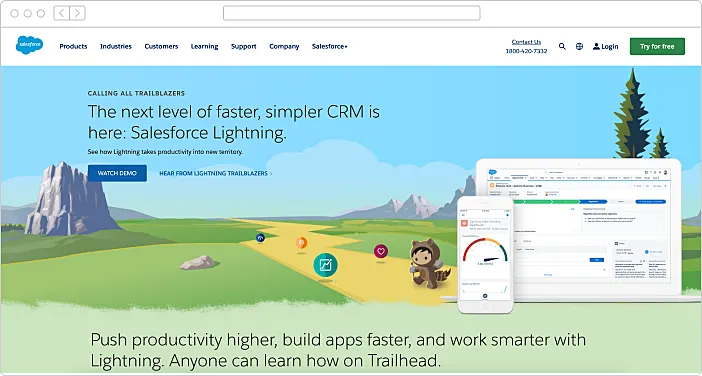
- Best Low-Code Development Platforms for Applications
- How do Low-Code Development Platforms Benefit Businesses?
- Selection Criteria for Low-Code Development Platforms!
- Cost of Creating an App Using Low-Code Application Development Platform!
- Top 10 Low Code Platforms Comparison - Setting the Entries Against Each Other
- Key Takeaways

Low-code development platforms are turning out to be an efficient alternative to traditional software development practices. Their perks such as reducing the overall time to build an app, lower development costs, and more, are triggering the rising popularity of these platforms.
According to Statista, the global low-code development platform market is rising at a CAGR of 26.1% between 2022 to 2024. The approximate revenue from the industry is expected to touch approximately $32 billion by the year-end.
Low code development platforms, or LCAPs, as the world knows them have the ability to automate several development stages. These tools make development more accessible for amateur developers or non-technical business owners. Additionally, eliminating the traditional coding process reduces the probability of technical glitches. Ultimately, making app testing cheaper and app launch faster.
Best Low-Code Development Platforms for Applications
Low-code platforms democratize AI for app developers or anyone looking to build an app with limited coding knowledge.
A MobileAppDaily interview with Farhat Habib, Senior Director at Ikigai, illuminates the importance of artificial intelligence for people without coding skills.
Check out the full interview here-
Moving further, this list of low code development platform examples introduces you to the industry maestros. We curated options that were popular among the top app development companies. Additional factors such as popularity, reviews, and more were considered as well.
1. Appian

Appian comes with a free trial. The tool is considered a prominent leader in enabling the automation of the development process. Statistically, Appian has displayed prominent growth among the top low code development platforms out there.
The app builder without coding delivers a 20x faster deployment speed. It is being used by various organizations to improve customer experience, simplify global risk management, and achieve operational excellence.
Appian has also managed to secure #1 for Business Workflow Automation among the best low code development platforms in the market. Its packages are categorized into three-
Notable features of Appian
- Plan and develop an app within minutes;
- No technical knowledge is required to use Appian
- Easy-to-configure APIs to increase the integration speed
- Supports the development of responsive websites
- Comes with enhanced security certifications
Pros and Cons of Appian:
| Pros | Cons |
|---|---|
| Rapid application development, reduced development costs, and citizen developer-friendly | Potential limitations for highly complex or custom applications |
| Efficient workflow management, improved operational efficiency, and reduced manual errors | Steep learning curve for complex process modeling |
| Seamless integration with various systems and data sources, and enhanced data accessibility | Complexity in managing numerous integrations |
| Ability to handle increasing workloads and user base with flexible deployment options | Potential performance issues with large-scale deployments without proper optimization |
Use this best low-code app builder here
2. Microsoft PowerApps

Microsoft PowerApps lets you or your teams develop apps and launch them instantly with the help of pre-built templates. The low code mobile app development platform offers advanced functionalities in the apps. Microsoft PowerApps enables enterprises to re-architect their legacy applications or build them from scratch.
Professional developers can create more advanced apps with the help of Azure functions offered by this no-code mobile app development platform.
As for the cost, Microsoft PowerApps remains one of the most affordable low code application development platforms out there. Its services are accessible in two plans-
- Developer Plan: This free-of-cost plan is designed to help developers execute app testing routines across three environments.
- Power Apps Premium: A 20$ per user monthly plan designed for licensed users to build and launch unlimited modern applications seamlessly.
Notable features of Microsoft PowerApps:
- This low-code app builder offers a wide variety of UIs and templates
- Enables app integrations like Office 365, Power BI, and Dynamics 365
- Supports the development of multiple app types
- Can integrate advanced functions earlier limited to manual coding
- Offers an approximate 74% reduction in app development costs
Pros and Cons of Microsoft PowerApps:
| Pros | Cons |
|---|---|
| Rapid application development, reduced development costs, and citizen developer-friendly | Potential limitations for highly complex or custom applications |
| Efficient workflow management, improved operational efficiency, and reduced manual errors | Steep learning curve for complex process modeling |
| Seamless integration with various systems and data sources, and enhanced data accessibility | Complexity in managing numerous integrations |
| Ability to handle increasing workloads and user base with flexible deployment options | Potential performance issues with large-scale deployments without proper optimization |
Use this low-code mobile app development here
3. GeneXus

GeneXus is one of the most customizable low code development platforms servicing 9,000+ companies from all around the world. This best low code platform allows you to develop apps and keep ownership without having to share their source codes or copyrights.
To make the app development process smoother and more effective, GeneXus uses AI to accompany the low-code development process. You can create more efficient apps within much less time and with less effort on this no-code app builder platform.
Notable features of GeneXus:
- Build cross-platform apps automatically without any hassle
- Supports the development of online and offline apps
- The low-code app builder supports SAP and ERP development
- Supports app and source code ownership
- Immediate previews to verify the development accuracy
Pros and Cons of GeneXus:
| Pros | Cons |
|---|---|
| Rapid application development with reduced time-to-market | Low potential for complex code due to automation |
| Single codebase for multiple platforms and consistent user experience | Limited customization options for specific platforms |
| Enhanced development capabilities with improved decision-making | Dependency on AI accuracy leading to potential bias |
| Potential cost savings compared to traditional development | Licensing costs can be high, especially for large-scale projects |
Use this app builder without coding here
4. Studio Creatio

This powerful tool lets you build custom solutions or edit existing ones without much technical knowledge. You can use this platform to build AI-supported business solutions without any hassle and in less time.
This one of the best low code development platforms allows extensive integration with technologies like .Net tools, SOAP, REST, OData, and open API. Moreover, swift integration allows apps to be developed according to any ecosystem of organizations.
Additional technological applications like Microservice architecture, open-source support, all-level-security, scalability and fault tolerance, and extendable platforms are some of the additional perks that gave Studio Creatio a position in our low code development platform list.
Notable features of Studio Creatio:
- The no-code app builder offers several templates
- Upgrade apps with new technologies faster
- While designing a process, collaborate with your team on the platform itself
- Use remote view, comments, editing, etc features to work in collaborations
- Convert process descriptions in PDF anytime for easy exports
Pros and Cons of Studio Creatio:
| Pros | Cons |
|---|---|
| Rapid development along with less dependency on IT resources. | Limited customization is required for complicated requirements |
| Flexibility to adapt to specific business requirements | Requires technical expertise for advanced customizations |
| Increased efficiency and reduced manual tasks | Dependency on the platform to change the process |
| Connectivity with various systems | Managing multiple integrations is complex. |
Use this best low-code app builder here
5. Mendix

The Mendix no-code development platform has helped users create 100,000+ apps on the platform. It doesn’t matter if you are building the app for yourself or your business; whether you have a team or not, you can build apps on the low code software development platform with no hassle.
With no or little app development knowledge, you can own high-quality app solutions for any sector in this no-code development platform.
All you need is a powerful idea to begin with. Mendix also lets you leverage AI in app development procedures. Several brands, including Zurich, Mitsubishi Electric, Fugro, and more, have trusted the platform.
Notable features of Mendix:
- Leverage technologies like IoT, machine learning, predictive analytics, etc
- Deploy apps with a single click once built
- Automated testing and a QA system allow you to build flawless apps
- The platform supports project collaborations and management
- Mobile and tablet app previews allow you to review your apps in real-time
Pros and Cons of Mendix:
| Pros | Cons |
|---|---|
| Rapid development regardless of app complexity | Steeper learning curve for newbies |
| Capability to create a prototype in hours | Requires technical expertise to create complex projects |
| Offers a variety of customizable elements | Created more from the perspective of large companies |
| Compatible with various systems | Requires advanced coding to unveil the full potential |
Use this low-code software development platform here
6. Outsystems

Outsystems allows you to develop apps and upgrade them according to business and technical needs. The platform is greatly assisting full stack developers by reducing the requirement of coding and overall development time.
As for customer service, the staff is available 24x7 through live chats, e-mail, and calls. There are a plethora of courses as well for new developers in the industry. These courses are designed to break down the development process in depth.
Moreover, if you are an experienced developer, Outsystems allows you to use your custom codes in-app scripts to add additional features. Security features offered by this low code mobile app development platform provides modern protection to your apps.
Notable features of Outsystems:
- Superior Technical Support (SLA) is available for critical situations
- Outsystems allows a collaborative environment for team members
- A real-time dashboard to check app health
- Connect your apps with any system easily on this platform
Pros and Cons of Outsystems:
| Pros | Cons |
|---|---|
| Supports the flow of the project to make it flawless | Difficult in terms of on-premise implementation and disaster recovery |
| Handles large-scale applications along with cloud-native architecture | Requires careful planning to produce optimal performance |
| Relatively easy to learn for non-developers with the visual approach | Requires specialized knowledge to integrate advanced features |
| Much more affordable in comparison to traditional development | Licensing costs can be significant for large-scale projects |
Use this no-code development platform here
7. QuickBase

This automated app development solution gives tough competition to its alternatives due to features like resource management solutions, project management solutions, delivery & installation solutions, etc.
The top no-code app builder platform gives you relaxation against the high cost of manual coding and saves you time and effort. Moreover, you can integrate all the data spread on multiple platforms to manage it from QuickBase.
The low-code mobile app development platform is trusted by several industry leaders, including Amazon, P&G, CVS Pharmacy, and more. To test its abilities, you can access a free trial for a limited tenure.
Notable features of QuickBase:
- The centralization feature allows for reducing the overall development time and cost
- The platform provides tutorials and guides to maximize its experience
- You can automate the workflow through its form-based UI
- It allows you to integrate with existing tools and app systems
Pros and Cons of QuickBase:
| Pros | Cons |
|---|---|
| Intuitive interface that requires minimal coding | Steep learning curve for complex applications |
| High degree of customization for flexible app building | Complex customizations might require advanced knowledge |
| Robust data management capabilities along with strong reporting | Data import/export limitations in some cases |
| Can handle growing data and user needs | Performance might degrade with extremely large datasets |
Use this no-code mobile app development platform here
8. Integrate.io

Integrate.io is a simple, low-code platform that helps businesses handle data easily. With Integrate.io, you can set up data pipelines quickly without needing a lot of coding knowledge. This helps you make decisions based on your data.
The best low code development platform works with many types of data sources, such as databases, cloud storage, and apps. You can pull all your data into one place. It offers real-time data integration, automatic workflows, and tools to turn raw data into helpful insights.
Security is a critical component of Integrate.io. It protects your data with strong security measures like complete encryption. It also follows important rules like GDPR and HIPAA to keep your data safe.
Integrate.io is perfect for marketers, data analysts, and IT workers. It simplifies data tasks, helping you manage your data better. This lets you use your data to grow and improve your business faster.
Notable features of Integrate.io:
- Helps you build GDPR and HIPAA-compliant apps
- Delivers perfect encryption for data security
- Comes with databases and cloud storage options
- Useful for making data-based developments
Pros and Cons of Integrate.io:
| Pros | Cons |
|---|---|
| Capable support staff in terms of handling the product | Hard to determine job fails from error logs at times |
| Quick and responsive along with free unlimited hours of Sandbox | Difficult in terms of debugging errors |
| Supports custom integrations through REST APIs | Limited functionality for real-time data streaming (may require additional development) |
| Secure cloud-based platform with robust data encryption | Limited control over data location for some users with strict data residency requirements |
Use this one of the best no-code platforms here
9. Oracle APEX

This one of the best low-code platforms reduces the complexity of mobile app solutions for businesses, individuals, or expert developers. Tasks like manipulating data, creating charts, processing data, editing data, etc, get easier with this one of the top low-code platforms.
Its stunning ability to create visually appealing charts in apps by leveraging Oracle JET helped Oracle APEX secure a place in our low code development platform list. These highly customizable charts have many color options and support multiple forms of data in this top low-code app development.
On top of that, you can integrate data from various sources like local databases, a remote Oracle database, or web services in Oracle APEX, one of the top low code development platforms. This enables you to centralize the data processing and management for your high-quality apps.
Notable features of Oracle APEX
- A sophisticated filtering system makes it easy to find data anytime
- An interactive Grid Component to select and edit data in bulk
- REST-Enable SQL Services enable accessing data and executing SQL
- Build and edit data from Oracle APEX, SQL Developer, or PL/SQL APIs
Pros and Cons of Oracle APEX:
| Pros | Cons |
|---|---|
| Allows for faster development cycles | Customization can be challenging for full-stack development |
| Seamless access and manipulation of database data | Requires some understanding of PL/SQL and database concepts |
| Lower development and maintenance costs compared to traditional methods | Applications are tightly coupled to the Oracle database |
| Pre-built components for various UI elements to accelerate development | Smaller community compared to other low-code platforms, potentially limiting support and resources |
Use this one of the best low-code development platforms here
10. Kissflow

Business Process Management (BPM) allows you to build business processes without any knowledge of coding. You can create an end-to-end workflow platform that enables user control without any hassle.
Its intuitive work management approach and independence of collaboration with other users make it unique. Kissflow’s userbase include names like Pepsi, Caribbean Airlines, Motorola Solutions, and Schnucks among others.
The stunning case management dashboard makes it easier to access and prepare product strategies on a single screen. Additionally, it can also connect to several Project Management Software easily including Slack, Dropbox, Mailchimp, and more.
Notable features of Kissflow
- Includes case management feature for reporting incidents and automatic debugging
- Bug tracker provides a report sorted according to priorities
- The platform offers a detailed analysis report for your assurance
- Kissflow lets you design fully customized forms for your application
- The simple design makes it easy to use for people with no coding experience
- Real-time metrics allow you to keep track of each workflow process
Pros and Cons of Kissflow:
| Pros | Cons |
|---|---|
| User-friendly interface, minimal learning curve, and drag-and-drop workflow builder | Complex initially for new users especially for advanced features |
| Highly customizable workflows, forms, and approvals | Complex customizations might require advanced knowledge or technical support |
| Streamlines processes, reduce manual tasks, and improves efficiency | May require adjustments for complex or dynamic workflows |
| Integrates with multiple systems and applications | Integration capabilities are limited for specific systems |
Use this one of the top low-code development platforms here
11. DWKit
DWKit’s main feature is that it is a low code app development platform that is able to leverage other technologies. For example, MS SQL Server, PostgreSQL, and Oracle as its database. Moreover, DWKit supports FormBuilder, Workflow management, Continuous integration services, delivery, deployment, etc. To make it easier to use, DWKit comes with a video tutorial for its users.
The Low-code + workflow platform provides a self-hosted low-code platform for web and mobile application development. Its ability to enable a 4x launch makes it one of the outstanding low code development platform examples.
Notable features of DWKit:
- Drag&drop interaction reduces the development time, cost, and efforts
- An ultimate license provides complete access and control over the source codes
- The platform enables you to build, test, debug, and launch applications within weeks
- Customize the UI or change the behavior of web browsers without coding knowledge
- DWKit comes with Workflow designer solutions and the data layer
Pros and Cons of DWKit:
| Pros | Cons |
|---|---|
| Affordable with free tiers | Expensive along with hidden costs |
| User-friendly interface and a low learning curve | Steep learning curve and a complex setup |
| Comprehensive features along with customization options | Limited features leading to inflexible apps |
| Handles large datasets and grows with business | Limited scalability and performance issues with large datasets |
Use this one of the best no-code platforms here
12. Salesforce Lightning

This free low-code platform allows you to save 25% of the time by providing no-code or low-code development opportunities. Moreover, you can add analytics, prediction analysis, AI, etc., to your apps to make them smarter. The built-in AI in this free, low-code platform also helps you in developing high-quality apps faster and without any complications.
Salesforce Lightning also enables faster drag & drop functionality. This can increase the overall development speed by a larger ratio.
Notable features of Salesforce Lightning:
- Reuse and develop components to integrate them with apps
- Supports easy integration from various industries and their business solutions
- It combines App Builder, Lightning Flow, SalesforceDX, and Heroku for speedy development
- Offers a 24x7 assistance
Pros and Cons of Salesforce Lightning:
| Pros | Cons |
|---|---|
| Modern, responsive, and user-friendly | Some users might find it different from Classic |
| Access to newer features and innovations | Not all Classic functionalities are available yet |
| More flexible and customizable | Can require more effort for complex customizations |
| Built for mobile devices | Some mobile features might still be limited |
| Improved with Lightning Web Components | Requires learning new development framework |
Use this no-code app builder here
How do Low-Code Development Platforms Benefit Businesses?
Leading app development companies in the USA, India, the UK, and other corners of the world are moving towards the most customizable low code development platforms for several reasons. So, let’s break down the benefits of low code development:
1. Faster App Development
Adopting low-code development has become a common practice, practically to multiply the speed of the development process. Integrating low-code platforms in-game app development, enterprise development, and other such practices helps make apps trendier with less effort.
2. Save Money on Development
Since apps can be made faster, they cost less to make. Low-code platforms mean you don't need many highly skilled coders. Sometimes, even people who aren't coders can make or help make apps. This saves money and lets businesses use their money more wisely. Also, apps get to market faster, which saves even more time and money.
3. Easy Updates and Growth
Businesses need to change quickly as technology or customer needs change. Low-code platforms make it easy to change apps with little effort. You can update apps and see the changes right away. These apps can grow as your business grows without needing to rebuild them.
4. Business and IT Work Better Together
In many companies, the business side and IT don't always match up well. Low-code platforms help solve this by letting more people make apps, not just IT pros. This means apps are more likely to do what the business really needs.
5. IT Teams Can Do More
IT teams often have too much to do. Low-code platforms can take off some of that load. They make app building faster and let other people in the company make changes. This lets IT pros work on bigger projects. Also, many low-code tools check your work as you go, which makes everything even faster.
6. Safer and Compliant
Low-code platforms help manage risks better. They use standard ways of building apps that include security from the start. This means less worry about data leaks or breaking rules. Everything about building the app is done in one place, which makes it easier to keep an eye on.
7. Everyone Can Innovate
Low-code platforms make it easier for everyone to try out new ideas. They take away the need for deep tech skills to build something new. This lets people who know the business challenges best try out their ideas quickly and safely.
Selection Criteria for Low-Code Development Platforms!
Choosing the right low-code development platform can be crucial for successful application development. Therefore, here are the criteria for you to shortlist an incredible tool for yourself.
1. Functional Criteria
Development Capabilities:
- Visual modeling tools (drag-and-drop)
- Pre-built components and templates
- Integration with third-party systems (APIs, databases)
- Support for different application types (web, mobile, desktop)
- Customization options (coding, scripting)
Target User Profile:
- Citizen developers (business users)
- Professional developers
- Both
Application Complexity:
- Handles simple to complex applications
- Supports business process automation
- Offers advanced features (AI, machine learning, IoT)
2. Technical Criteria
Scalability:
- Handles increasing user loads and data volumes
- Supports cloud-based deployment
Performance:
- Response time and application speed
- Optimization features
Security:
- Data encryption and protection
- Access controls and authentication
- Compliance with industry standards (GDPR, HIPAA, etc.)
Integration Capabilities:
- Connects to various data sources and systems
- Supports different integration protocols (REST, SOAP, etc.)
Deployment Options:
- On-premises, cloud, hybrid
- Deployment flexibility and speed
3. Organizational Criteria
Vendor Reputation:
- Market presence and stability
- Customer support and services
- Community and ecosystem
Pricing Model:
- Licensing fees, subscription costs
- Pay-per-use options
- Total cost of ownership (TCO)
Training and Support:
- Availability of training resources
- Documentation and tutorials
- Technical support options
Alignment with Business Goals:
- Supports digital transformation initiatives
- Aligns with IT strategy
- Accelerates time-to-market
Evaluation Process
- Define Requirements: Clearly define the outline of the application needs, target users, and desired outcomes.
- Shortlist Platforms: Research and identify potential platforms that are based on your requirements.
- Evaluate Platforms: Compare the features, pricing, and vendor capabilities that are used by the matrix.
- Proof of Concept (POC): Build small-scale prototypes to test the capability of the platform.
- Pilot Implementation: Deploy a limited version of the application to assess the performance and the acceptance of the users.
- Select and Implement: Choose the platform that best serves your needs and execute a full-scale project.
Additional Considerations:
- Vendor Lock-in: Evaluate the openness of the platform and its ability to migrate to other platforms.
- Future-Proofing: Consider the platform's roadmap for new features and technologies.
- Governance and Compliance: Ensure that the platform aligns with your organization’s security and compliance standards.
Cost of Creating an App Using Low-Code Application Development Platform!
The cost of creating an app using a low code app development platform can vary significantly. It is considering the number of factors that play a role in increasing the cost of development. So, here’s a breakdown:
Key Factors Affecting the Cost of Low-Code Development:
- Platform Choice: Acquiring different platforms requires varying costs because of different pricing models. For example, subscription, per-use, per-app, etc.
- App Complexity: Simple apps cost less while complex ones require advanced features, integrations, and custom logic.
- Platform Features: Additional features like AI, machine learning, or advanced analytics can increase costs.
- Number of Users: Some platforms charge based on the number of users affecting the overall cost.
- Deployment and Hosting: The app's cost depends on the platform and the infrastructure required.
- Customization: Extensive customization requires additional development or platform tiers that impact the overall cost.
- Integrations: Integration with other systems or data sources that incur additional charges.
- Support and Maintenance: Ongoing support and maintenance costs that pose significant costs.
Typical Cost Range for Low-Code App Development:
While exact figures can fluctuate, here is a general estimate:
- Basic apps: $500 - $5,000
- Medium-complexity apps: $5,000 - $20,000
- Enterprise-level apps: $20,000+
Additional Considerations:
- Hidden Costs: Be aware of hidden costs like additional features, integrations, or support packages.
- Free Trials: Many platforms provide free trials so evaluate before finalizing.
- ROI: Consider the potential ROI (return on investment).
Top 10 Low Code Platforms Comparison - Setting the Entries Against Each Other
Finding the right tool can always be a hassle if you don’t have a clear comparison between the offerings. To help you make up your mind, we tried to cater to this issue. We provided a top low code platforms comparison below so let’s check it out:
| Platform | Key Features | Free Trial/Plan | Notable Clients |
|---|---|---|---|
| Appian |
| Free trial available | Salesforce, Gartner, IBM, etc. |
| Microsoft PowerApps |
| Developer Plan (Free) | Enterprises re-architecting legacy applications |
| GeneXus |
| Contact for details | 9,000+ companies worldwide |
| Studio Creatio |
| Contact for details | Businesses needing rapid integration and AI support |
| Mendix |
| Contact for details | Zurich, Mitsubishi Electric, Fugro |
| Outsystems |
| Contact for details | Full stack developers needing less coding |
| QuickBase |
| Free trial available | Amazon, P&G, CVS Pharmacy |
| Xplenty |
| Contact sales team | Cross-platform experts and companies handling big data |
| Oracle APEX |
| Contact for details | Pepsi, Caribbean Airlines, Motorola Solutions |
| DWKit |
| Contact for details | Businesses needing a self-hosted platform |
| Salesforce Lightning |
| Free plan available | Various industries |
Key Takeaways
Almost every industry is recognizing the potential of mobile apps, which has resulted in a rising number of apps. In 2023 alone, over 257 billion apps were downloaded. This competitiveness makes it critical to adopt apps to revolutionize the business strategy. In case resources are limited, low code development platforms can come in handy.
As we've seen, above-mentioned LCAPs empower individuals and organizations alike, turning intricate coding processes into accessible, efficient, and cost-effective solutions. As you include the best low code development platform in your app development strategy, remember: the power to innovate, disrupt, and lead in your industry is quite literally at your fingertips.
Frequently Asked Questions
-
What is the best low code platform?
-
How do low-code development platforms benefit businesses?
-
Why should I use a low-code development platform?
-
What are some top low-code development platforms?
-
Are low-code development platforms suitable for all types of applications?






















